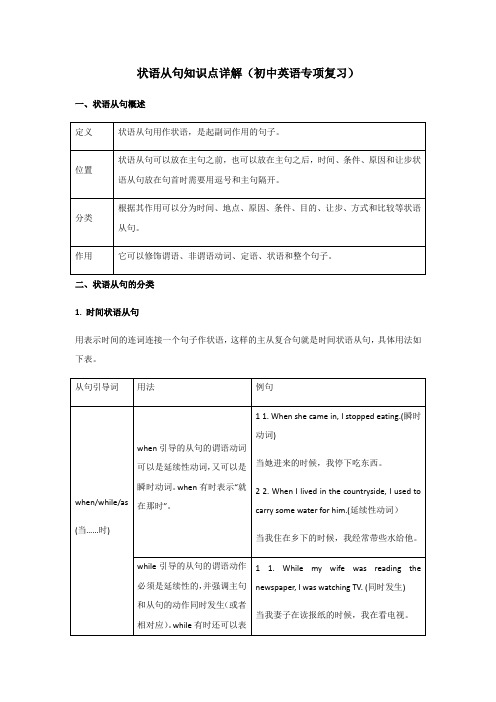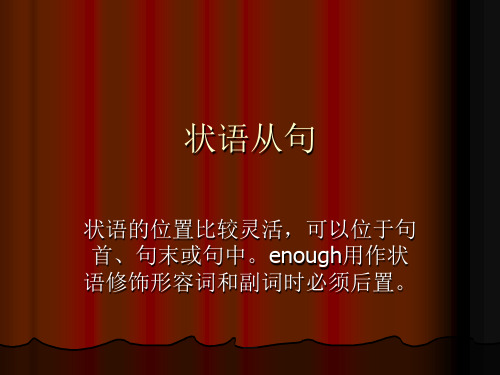初中英语人教版八年级上册状语从句
- 格式:doc
- 大小:20.50 KB
- 文档页数:2



状语从句知识点详解(初中英语专项复习)一、状语从句概述二、状语从句的分类1. 时间状语从句用表示时间的连词连接一个句子作状语,这样的主从复合句就是时间状语从句,具体用法如下表。
2.结果状语从句结果状语从句的从句部分是补充说明主句中谓语动词发生的结果的,通常位于主句之后。
引导结果状语从句的从属连词如下表。
3. 目的状语从句:从句部分是用以补充说明主句中谓语动词发生的目的。
1). so that 以便……(达到某种目的)如:You must speak louder so that you can be heard by all.你要大点声说,这样大家就都能听到你了。
2). in order that 为了……,如:She got up early in order that she could get to school on time.=She got up early in order to get to school on time.为了能够准时到校,她很早起床。
4. 条件状语从句由连接词if或unless引导的状语从句叫做条件状语从句。
注意:1). unless 从句里的谓语只能是肯定式,因为unless本身表示否定;unless=if not,如:Let's go out for a walk unless you are too tired. =If you are not too tired, let's go out for a walk.如果你不是很累,我们出去散个步吧。
2). 在真实条件句中,主句不能用be going to表示将来,该用shall, will.如:If you will(愿意) wait a minute, I’ll go and tell my mother that you are here.如果你愿意等一分钟,我将去告诉我妈妈你在这里。
3). 下列从句中的will不是将来时助动词,而是情态动词。


初中英语状语从句知识点总结归纳在初中英语中,状语从句是一种复杂的句子结构,它用于描述主句的动作发生的时间、条件、原因、结果、地点等。
以下是关于初中英语状语从句知识点总结归纳:一、状语从句的定义:状语从句是用来修饰主句中的动词、形容词或副词,表示时间、地点、原因、条件、结果等关系的从句。
二、状语从句的分类:根据引导词的不同,状语从句可以分为以下几类:1. 时间状语从句:由when, while, as, before, after, since, until等引导。
2. 地点状语从句:由where, wherever, everywhere等引导。
3. 原因状语从句:由because, since, as等引导。
4. 条件状语从句:由if, unless, as long as等引导。
5. 结果状语从句:由so that, so...that, such...that等引导。
三、状语从句的用法:1. 时间状语从句:表示动作发生的时间或持续的时间。
例如:When I was young,I often played football.(当我还小的时候,我经常踢足球。
)2. 地点状语从句:表示动作发生的地点。
例如:Wherever you go, I will followyou.(无论你去哪里,我都会跟着你。
)3. 原因状语从句:表示动作发生的原因。
例如:As it was raining, we had to stay indoors.(因为下雨了,我们不得不呆在室内。
)4. 条件状语从句:表示动作发生的条件。
例如:If it snows tomorrow, we will not go out.(如果明天下雪,我们就不出去了。
)5. 结果状语从句:表示动作发生的结果。
例如:She worked hard so that she could pass the exam.(她努力学习以便能通过考试。

初中英语状语从句知识点总结(一)用来修饰主句中的动词,形容词或副词等而充当状语的从句叫做状语从句。
状语从句常用从属连词来引导,与主句连接起来。
若置于句末,则前面不加逗号。
根据意义和作用,状语从句可分为时间原因条件等几种。
下面我们就来分析一下这几种状语从句。
1时间状语从句时间状语从句常用从属连词when,after,until,as soon as,等来引导。
当主句是祈使句或谓语动词是一般将来时态或情态动词时,其时间状语从句中的谓语动词常用一般现在时态表示将来发生的动作或存在的状态。
这就是我们常说的“主将从现”。
如:Please call me when you get there.当你到那时,请给我打个电话。
I will write to you as soon as I arrive in Beijing.我一到北京就给你写信。
<温馨提示>since引导时间状语从句表示“自从…以来”,从句中的动词一般表示动作的起点,用过去时;而主句的动作延续的情况则用一般现在时或现在完成时。
常用的句型为:It has been/is+一段时间+since+过去时。
如:I has been/is three years since we met last time.自从我们上次见面,已经三年了。
2条件状语从句引导条件状语从句的连词或词组有:if(如果),unless(除非),as long as(只要)等。
如果主句是将来时,条件状语从句也用一般现在时来表示。
如:I will stay at home if it rains tomorrow.如果明天下雨,我就待在家。
You can’t learn English well unless you wo rk hard.除非你努力学习,否则是学不好英语的。
<温馨提示>由if引导的条件状语从句,若从句表达的是与现在事实相反的事实,则常用虚拟语气,即用过去时态表示(如果涉及到be动词,一律都用were)。
初中英语状语从句完整版课件一、教学内容本节课我们将学习人教版初中英语教材第九章“状语从句”的内容。
具体包括了解状语从句的概念、分类及用法,掌握时间状语从句、地点状语从句、原因状语从句、条件状语从句等常见类型,并通过实例讲解和练习,使同学们能够熟练运用各类状语从句。
二、教学目标1. 了解状语从句的概念,掌握各类状语从句的用法。
2. 能够运用所学状语从句进行句子构建,提高英语表达能力。
3. 通过学习状语从句,培养同学们的逻辑思维能力和语言运用能力。
三、教学难点与重点重点:状语从句的分类及各类状语从句的用法。
难点:如何正确运用各类状语从句,使句子表达更加准确、流畅。
四、教具与学具准备1. 教师准备:多媒体课件、黑板、粉笔。
2. 学生准备:教材、笔记本、练习本。
五、教学过程1. 导入:通过一个实践情景引入,如描述一场篮球比赛,引导同学们关注句子中的状语成分。
2. 新课内容讲解:(1)状语从句的概念及分类。
(2)时间状语从句:常用引导词(如when、while、as、after、before等),举例讲解并引导同学们进行句子构建。
(3)地点状语从句:常用引导词(如where、anywhere、everywhere等),举例讲解并引导同学们进行句子构建。
(4)原因状语从句:常用引导词(如because、since、as、for 等),举例讲解并引导同学们进行句子构建。
(5)条件状语从句:常用引导词(如if、unless、as long as 等),举例讲解并引导同学们进行句子构建。
3. 例题讲解:结合教材中的例题,对各类状语从句进行讲解,分析句子结构,引导同学们掌握解题方法。
4. 随堂练习:发放练习题,要求同学们运用所学状语从句进行句子构建,教师巡回指导,解答同学们的疑问。
六、板书设计1. 状语从句的概念及分类2. 时间状语从句:when、while、as、after、before3. 地点状语从句:where、anywhere、everywhere4. 原因状语从句:because、since、as、for5. 条件状语从句:if、unless、as long as七、作业设计1. 作业题目:(1)请运用所学状语从句,描述一下你周末的计划。
错题归纳
一:译短语
1.关于羊毛的历史_________________________
2.用字母顺序_____________________________
3.想喝些茶_______________________________
二:汉译英
孩子们在公园里高兴地玩。
The children are __________________________ in the park .
三:用适当形式填空
1.Smoking makes your body ____________ . (health)
2.The old man has two sons . One is a worker , ___________ is a teacher . (用适当代词填空)
3.Some of us like singing and dancing . _________ go in for sports . (用适当代词填空)
4.The ________ _________ many __________ (invent)
5.The ________ _________ many _________ (paint)
6.Mozart and Beethoven are famous __________ (music)
7.The young _______ ( Italy ) work in my school .
8.A bag of sugar fell to the ground and broke ________ (open)
9.I can’t study well because a group of boys are playing outside ________ (noise)
10.This model house ____________ (make) two years ago .
11.The first edition ________________ (publish) in 1768.
12.Since then , we ____________ (be) good friends .
四:单选
( ) 1.Many dinosaurs ate ______ . Some of them liked to eat ________ .
A.meat , meat
B.plants , plants
C. plants , meat
D.meat , plants . ( ) 2.Phone me ______ time you like tomorrow . I’ll be at home all day .
A.any
B.some
C. a little
D. a few
( ) 3.You are going to read two articles ______ an encyclopaedia .
A.from
B.in
C.on
D.of
( ) 4.--The story is so amazing ! It’s the most interesting story I’ve ever heard .
--But I’m afraid it won’t be liked by _____ .
A.everybody
B.somebody
C.anybody
D.nobody
( ) 5.--Who’s in the ro om ? -- ______ .
A.No one
B. Anybody
C.Nobody
D.None
( ) 6.______ of us wants to read it .
A.Everyone
B.Every one
C.All
D. Nobody
( ) 7.______ student in our class can answer this easy question .
A.Anyone
B.Some
C.Any
D.Someone
( ) 8.I don’t want to use your pen . I want _____ .
A.somebody else’s
B.somebody’s else
C.somebody else
D.somebody’s else’s ( ) 9.--When shall we meet again?
--Make it ______ day you like . It’s all the same to me .
A.one
B.another
C.some
D.any
( ) 10.--Would you like to go to the concert with me tonight ?
-- I’d love to , but ____ of us couple has tickets . Do you have some ?
A.both
B.all
C.neither
D.none
( ) 11.Walking along the street , you can see many beautiful flowers on ____side’s of the street .
A.every
B. all
C.both
D.either
( ) 12. Peter , show me your _____ hand What’s in it ?
A.other
B. the other
C.another
D.the others
( ) 13.--What does your friend ______?
--He’s tall and thin .
A.be like
B.like
C.look like
D.look
( ) 14. I like France . I often read ______ it ______ the newspaper .
A.about ;on
B. / ; on
C. about ; in
D. / ; in
( ) 15. I’m so happy to see you , Judy . I_______ know you ______ here .
A.don’t ; are
B.didn’t ; are
C. d on’t ; were
D.didn’t ; were
( ) 16.This boy _____ Tom . He’s from America .
A.called
B.is calling
C.is called
D.calling
五:句型转换
1.Tom may know more about dinosaurs . (改为同义句)
______ Tom _______ more about dinosaurs .
______ Tom _______ more about dinosaurs .
2.I saw nobody in the forest . (改为同义句)
I _____ _see _______ in the forest .
3.Some dinosaurs were as small as chickens . (改为同义句)
Some dinosaurs were small _____ ______ chickens .
4.Suddenly , dinosaurs all disappeared . (改为同义句)
Suddenly , dinosaurs all _______ _______ .
5.Nobody knows why . (改为反意疑问句)
Nobody knows why, ______ ______ ?
6.Jim doesn’t like playing the piano, and Jack doesn’t , either . (改为同义句)
_______ Jim _______ Jack likes playing the piano .
7.Both of the twins like the mooncakes with eggs in it . (改为否定句)
_______ of the twins _______ the mooncakes with eggs in it .
8.The shop opens at 8 a. m . and closes at 9 p.m . (改为同义句)
The shop _______ ________ from 8 a.m. to 9 p.m.。